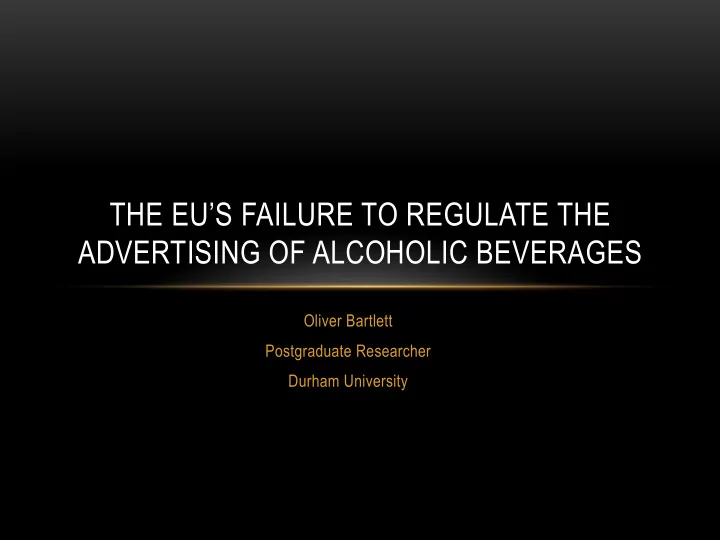

THE EU’S FAILURE TO REGULATE THE ADVERTISING OF ALCOHOLIC BEVERAGES Oliver Bartlett Postgraduate Researcher Durham University
INTRODUCTION L Smith and D Foxcroft, ‘The effect of • Alcohol abuse causes serious • alcohol advertising, marketing and harm to health – 60 known protrayal on drinking behaviour in diseases and conditions. young people: systematic review of prospective cohort studies’ , (2009) Addictive substance – 23m • BMC Pubic Health 9:51 Europeans dependent each year. • P Anderson et al, ‘Impact of alcohol advertising and media exposure on Alcohol advertising scientifically • adolescent alcohol use: a systematic linked to alcohol consumption review of longitudinal studies’, Alcohol and Alcoholism,(2009) 44(3), 229 EU Alcohol Strategy 2006 • • B Gunter, A Hansen and M Touri, EU Alcohol and Health Forum • ‘Alcohol Advertising and Young People’s Drinking’, (2009) Young AVMSD 2010. • Consumers , Volume 10, No 1, 4-16
RELEVANCE OF THE AUDIOVISUAL MEDIA SERVICES DIRECTIVE TO ALCOHOL ADVERTISING • Commission reluctant to propose harmonising legislation – AVMSD the frontline in alcohol marketing legislation instead • Article 9 – general requirements for all audiovisual commercial communications, 9(1)(e) for alcoholic beverages • Article 22 – specific rules for television advertising of alcoholic beverages only. See paper for more details.
ARTICLE 9(1)(E) ‘audiovisual commercial communications for alcoholic beverages shall not be • aimed specifically at minors and shall not encourage immoderate consumption of such beverages’. ‘specifically’ – no ban on showing to minors • WHO Framework for Alcohol Policy? • Minimum harmonisation Directive, Article 4: • • ‘Member States shall remain free to require media service providers under their jurisdiction to comply with more detailed or stricter rules in the fields coordinated by this Directive provided that such rules are in compliance with Union law’ Member States can improve, eg UK BCAP Code. • Statutory controls by the Member States? See full Paper for more detail •
HOW DO THE LIMITATIONS IN THE AVMSD’S SCOPE REDUCE ITS EFFECTIVENESS? Potentially harmful advertising may be excluded by definition of audiovisual • commercial communication: • ‘Images with or without sound which are designed to promote, directly or indirectly, the goods, services, or images of a natural or legal entity pursuing an economic activity. Such images accompany or are included in a programme in return for payment or for similar consideration or for self-promotional purposes. Forms of audiovisual commercial communication include, inter alia, television advertising, sponsorship, teleshopping and product placement’. • Remuneration and self promotional purposes – what happens to alcohol company website? Recital 22? • Self regulatory codes are broader – UK CAP Code covers : websites, emails, SMS, pop-ups and online advertisements in paid for space, viral advertisements, advergames… • However self-regulatory codes still suffer – complaints based system, enforcement, industry influence.
THE EU ALCOHOL AND HEALTH FORUM AND THE COMMITMENTS OF INDUSTRY OPERATORS ‘umbrella organisations operating at a European level, capable of playing an • active role in reducing alcohol-related harm in the EU’ ‘seek close coordination with all other actors, so that successful endeavours can • be more promptly shared with potential partners and emulators across the European Union as a whole’ . (Charter establishing the European Alcohol and Health Forum) 108 commitments – 33 on commercial communications – 12 at least relate to • educational aims. • Educational policies empirically weak in achieving results. 25 commitments from alcohol producers – relying on voluntary commitments • could be a flawed approach? • Diageo commitment – 70/30 rule for percentage of minors in an audience
CONSEQUENCES FOR PUBLIC HEALTH • Irresponsible alcohol advertising deliberately portrays alcohol or drinking lifestyle in positive light to underrepresent the dangers that unsafe consumption poses to human health. • Main consequence of ineffective EU legislation - Member States have to deal with regulation themselves. Not ideal for public health – alcohol producers will actively look for under- or un- regulated media formats to place marketing to avoid maze of compliance with national law.
CONCLUSION • Opportunity to thoroughly re-evaluate the position, learning from good points of national law and self-regulation • Given scientific evidence, little reason to be so cautious • Stronger controls are needed – EU Alcohol Strategy: • ‘One aim of this joint effort will be to reach an agreement with representatives from a range of sectors (hospitality, retail, producers, media/advertising) on a code of commercial communication implemented at national and EU level ’
Recommend
More recommend